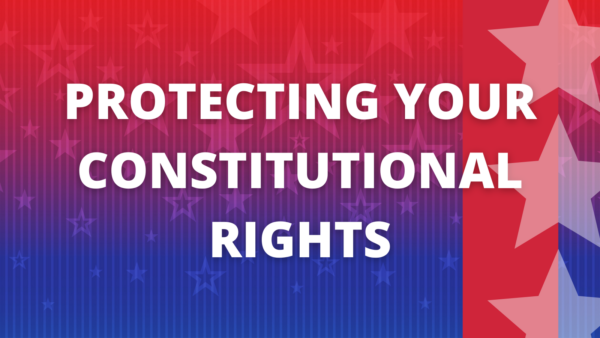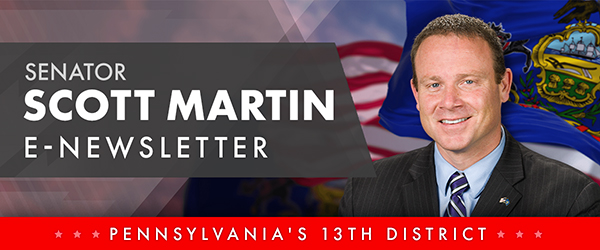|
View this email in a browser
In this Update:
- Reinforcing State Law for Second Amendment Rights
- Senator Martin Prioritizing Parents Education Bills Advance to the Full Senate
- Approving Tax Reform Measure for Small Business Employers
- Helping PA’s Economy and Veterans
- Financial Assistance Available Soon for Homeowners
- Control Your Electricity Costs with PA Power Switch
Reinforcing State Law for Second Amendment Rights

The Senate voted to reinforce Pennsylvanians’ Constitutional right to bear arms while continuing to safely protect our communities by preventing municipalities from bypassing state law prohibiting them from regulating firearms and ensuring those legally allowed to own a gun can carry it openly or concealed, without needing a permit.
Senate Bill 448 allows for an individual or member organization to sue a county or municipality that implements a local firearms ordinance in violation of existing state law; allows for individuals adversely affected by local action to seek relief and damages; puts the burden on the municipality to defend its actions instead of placing the burden on the individual; and makes it clear the General Assembly is the only elected body that is responsible for passing legislation related to the right to bear arms.
The legislation seeks to maintain uniformity in gun laws across the state and level the playing field for gun owners by allowing recovery of legal fees and damages if the municipality is found in violation of the state’s preemption law.
Senate Bill 565 allows for law abiding citizens to carry guns in a concealed manner without a permit. There will be an optional permit for firearm owners that will cover them for reciprocity purposes in other states which Pennsylvania already has an agreement in place.
Both bills now head to the state House of Representatives for consideration.
Senator Martin Prioritizing Parents Education Bills Advance to the Full Senate

Earlier this week I chaired a Senate Education Committee meeting that considered a legislative package that will prioritize the role of parents and guardians in the educational process and give them greater control as they advocate for their children. In addition, to passing several of my bills, House Bill 1660, sponsored by Rep. Curt Sonney (R-4) and House Bill 1642, sponsored by Rep. Martina White (R-170) were amended and advanced to the full Senate.
House Bill 1660 originally would have limited a school’s ability to shut down in-person education to 60 days for communicable diseases, rather than the four years that is currently allowed by law. However, it was amended to limit shutdowns to 21 days with one extension of 21 days. House Bill 1642, which focuses on students who attend economically disadvantaged schools through EITC and OSTC program reforms, was amended to expand the number of eligible students as well as increases scholarship amounts from up to $1,000 to up to $2,000 or up to a $4,000 if they are attending a secondary school.
My legislation, Senate Bill 931 makes changes to the EITC and OSTC programs to explicitly state that payments received from any governmental agency because of the pandemic cannot be included in calculating household income when determining eligibility. Another piece of legislation of which I am the sponsor, Senate Bill 932, revises the current definition of “school-related fees” within the context of the EITC and OSTC programs to allow for the use of program dollars for dual enrollment. Both of these bills passed out of the committee.
In addition, the Senate Education Committee voted to approve a letter I drafted to be sent to the Independent Regulatory Review Commission to convey objections to the Department of Education’s Charter School and Cyber Charter School proposed regulation #6-349. You can read more about these bills, the letter and other legislation by visiting my website.
Approving Tax Reform Measure for Small Business Employers

The Senate approved legislation to advance small business tax reform that would help move Pennsylvania out of a pandemic economy and create jobs for Pennsylvanians.
Senate Bill 347 would eliminate a disadvantage faced by Pennsylvania small businesses when competing with those in other states. Under federal tax law, a “like-kind” exchange under the Internal Revenue Code allows for tax deferral when property is exchanged for similar property. This long-standing federal provision allows employers to invest in the job-creating assets businesses need to remain competitive. Every state but Pennsylvania provides for a similar deferral on the state level.
The bill will now be sent to the House of Representatives for consideration. It is part of a Small Business Tax Reform Package to help employers recover from the COVID-19 pandemic and mandated shutdowns. Small businesses create 65% of the jobs in the commonwealth.
The Senate previously passed Senate Bill 349 to bring state tax law governing expense deductions in line with federal law, eliminating the unequal treatment of small businesses in Pennsylvania. The increase in limits makes it easier for employers to buy equipment and to invest, which promotes job growth.
Helping PA’s Economy and Veterans

To support Pennsylvania’s economy and veterans, the Senate supported legislation that would establish a Veteran-owned Business Loan Guarantee Program and would clarify the Veterans Preference Law to include veterans who served honorably but were discharged with a disability before completing their initial obligation.
Senate Bill 830 would create a program providing loan guarantees to commercial lending institutions that make loans to veteran-owned businesses. The program would authorize the Commonwealth Financing Authority to guarantee up to 50% of the outstanding principal of the loan, limited to $250,000 for any one loan.
Senate Bill 849 would add an exemption for those with a disability discharge and would ensure that veterans with medical discharges receive the preference with seeking careers within the Commonwealth.
Both bills now move to the House of Representatives for consideration.
Financial Assistance Available Soon for Homeowners

Pennsylvania has been allocated $350 million through the federal Homeowner Assistance Fund (HAF) to help homeowners behind on their mortgage and other home-related expenses due to the pandemic. The Pennsylvania Housing Finance Agency (PHFA) will administer the program and is working to develop the Pennsylvania HAF program, which must be approved by the U.S. Treasury before it can become operational.
Pennsylvania’s program will include an online and mobile application portal. Applicants will be able to apply and submit required documentation through the web-based application or may be assisted by a third-party counseling agency.
The program is expected to be available in the coming months, but homeowners may sign up now to receive updates about the financial relief. Click here to be notified or for more information.
Control Your Electricity Costs with PA Power Switch

As electric costs are on the rise and only projected to worsen throughout this winter, there has never been a better time to be proactive about controlling your electricity costs.
You can shop for your electricity and choose your supplier, regardless of your local utility, by researching your options on PAPowerSwitch.com.
Under state law, you have the option to switch to a competing supplier which can offer the lowest price or provide a specific service you want such as green or renewable energy. The electric utility that distributes your electricity will remain the same. You would simply be taking advantage of the power of competitive retail electric shopping to see if a better price is available with a supplier.
PAPowerSwitch.com offers comparison data regarding price, fixed-price contract terms, renewable content, deposit/cancellation fees and other consumer information.

If you have a question about the information in this e-newsletter or other state related matters that you would like a response to, please click HERE to submit your inquiry through my website. This will help to ensure that we are able to respond to your question in a timely fashion due to the high volume of emails and the ever growing amount of computer generated spam mail we receive daily.
|












